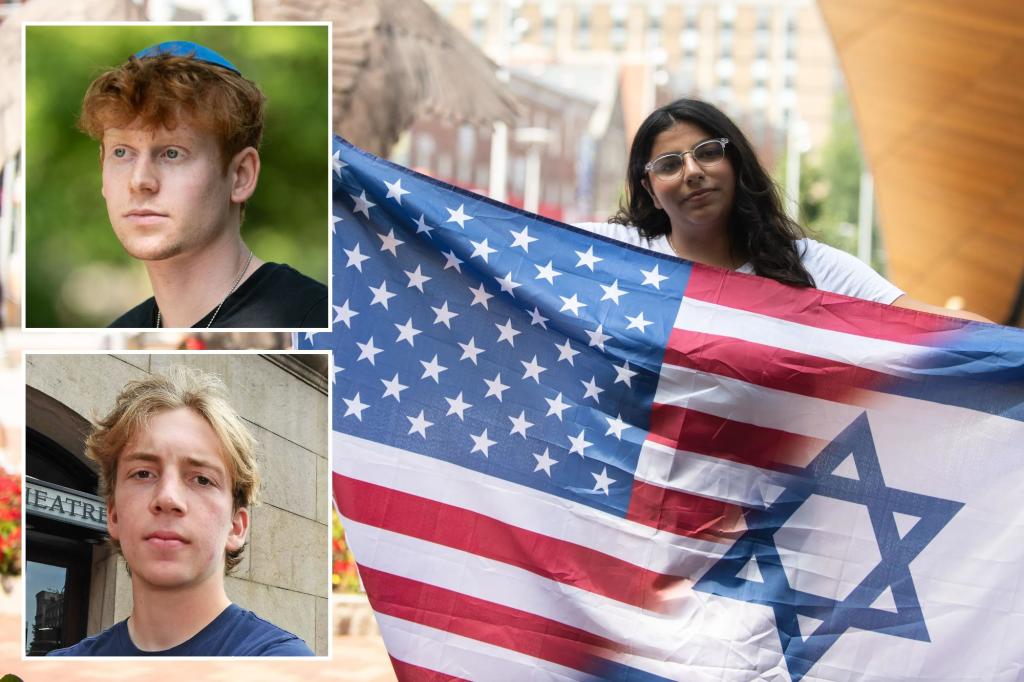As a new semester begins at colleges, concerns about campus activism and violence are rising, especially regarding the safety of Jewish students. Protests and encampments related to the Israel-Palestine conflict have taken over campuses nationwide, leading to investigations into antisemitism at schools such as Columbia, UPenn, Harvard, Cornell, UCLA, Temple, and others. A survey by Alums for Campus Fairness revealed that 44% of Jewish students do not feel safe identifying as Jewish on campus. The Post interviewed four Jewish students at universities facing antisemitism probes to discuss their concerns for the new school year.
Nicholas Baum, a Columbia freshman, had a positive experience at the university until protests erupted following a tragedy in Israel. He felt unsupported by the lack of solidarity from the Columbia community and was shocked by the blatant antisemitism expressed during the protests. As a sophomore studying economics and statistics, Baum is nervous about returning to campus, expecting protests to be similar, if not worse, than the previous year. He hopes his classmates will avoid antisemitism and treat Jewish students with decency.
At Temple University in Philadelphia, sophomore Yaam Malka experienced verbal harassment on campus, with students calling her names such as a baby killer, terrorist, and a k-word. Antisemitic vandalism, including painting “Free Palestine” on a Jewish fraternity house, added to the hostile environment. Malka, who studies psychology, political science, and economics, faced discrimination for advocating the release of Israeli hostages. She believes campuses across the U.S. are unsafe for Jewish students and anticipates the situation worsening as protesters are emboldened.
Noah Rubin enrolled at the University of Pennsylvania for its welcoming environment but found it unsafe for Jewish students after incidents of antisemitism, including graffiti and a bomb threat. The campus, facing a lawsuit, did not live up to Rubin’s expectations of safety. As a business and electrical engineering senior, Rubin worries about radical pro-Palestine faculty influencing students and the campus culture. Despite increased security, he doubts the situation will improve, and he criticizes the lack of response from the administration.
Arielle Cojab began her freshman year at NYU during escalating anti-Israel protests, feeling scared and resorting to hiding her Star of David necklace to avoid attention. She faced harassment from protesters and encountered divisive rhetoric on campus, even in classrooms. Cojab’s family, Syrian Jews from Mexico, has urged her to transfer due to the antisemitism she experienced. Support for Israel led to losing friends and feeling forced to hide her identity in certain situations. Cojab hopes to find genuine connections with people who accept her true identity.
Overall, Jewish students at various universities are experiencing antisemitism, harassment, and discomfort on campuses due to the Israel-Palestine conflict. The lack of solidarity from the broader student body, professors’ biases, and escalating protests are contributing to an unsafe environment for Jewish students. As a new semester begins, students like Baum, Malka, Rubin, and Cojab are navigating complex challenges related to their Jewish identity and safety on campus. The experiences of these students highlight the urgent need for colleges to address and prevent antisemitism and discrimination to create a safer and more inclusive academic environment.













